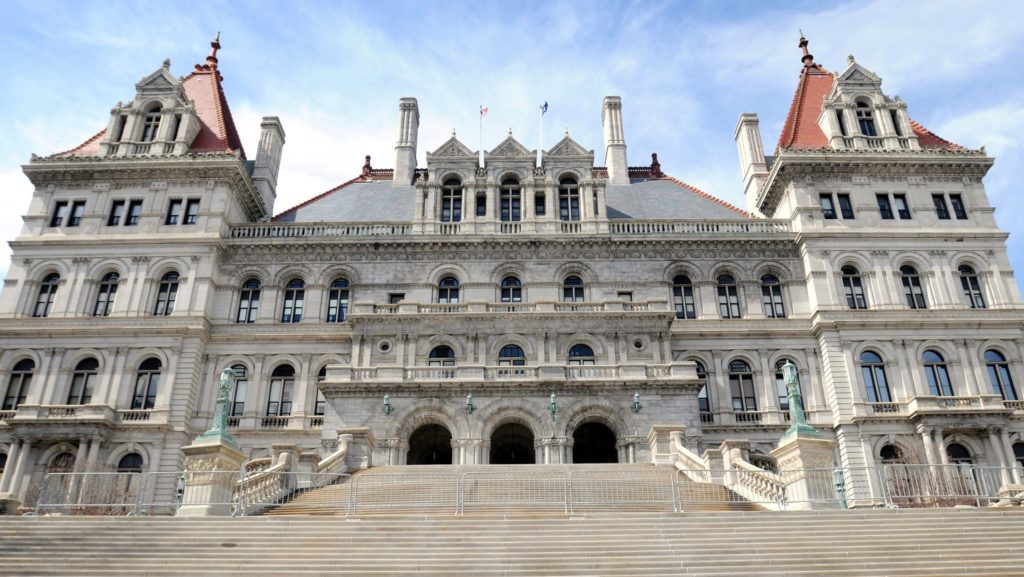The New York Senate has voted to legalize medically assisted suicide, a move that one Catholic bioethicist told OSV News marked "a dark day" for the state's residents, and the act will now head to Democratic Gov. Kathy Hochul.
State senators passed the Medical Aid in Dying Act in a June 9 evening session that, after two hours of debate, wrapped with a 35-27 vote in favor of the bill. In April, the measure had cleared the state Assembly by 81-67, just six votes over the required threshold of 75.
Hochul's office told the New York media outlet Advance/Staten Island Live that the governor “will review the legislation.”
If left unsigned before the Legislature ends its session June 12, the bill would automatically become law within 10 days (not including Sundays), according to New York state law. If Hochul vetoes it, the bill can still become law if a two-thirds majority of both houses votes to override her veto.
The act amends the state's health code to allow a terminally ill adult with a prognosis of six months or less to request from a physician a medication that would hasten his or her death, if the patient decided to take it.
With a name identical to that of Canada's assisted suicide law, the New York legislation specifies that the cause of death for those who opt to take the medication will not be suicide, but rather "the underlying terminal illness or condition."
New York's Catholic bishops had vigorously opposed the legislation, which they warned in an April 24 letter would usher New York state into "a dangerous new era."
While the legislation states that health care providers and facilities may choose not to participate in the provision of life-ending medication to a patient, wrote the bishops, passage nonetheless would leave vulnerable persons -- including those with disabilities, the elderly, and residents of impoverished and medically underserved communities -- subject to pressure and coercion to end their lives "so as not to be a burden to society or an excessive cost to insurance companies."
Charles Camosy, professor of medical humanities at Creighton University's School of Medicine, echoed that concern.
"It is a dark day for New York, and especially New Yorkers who are at risk for coercion," he said in a June 9 email to OSV News shortly after the act was passed.
He noted that "there is nothing new about the debate over physician-assisted killing," with New York managing to defeat the prospect over the past decade.
But, said Camosy, "what's changed is that the arguments on the side of privileged populations who want the illusion of control have now defeated those who were standing up for the most vulnerable."
"It's going to be this terrible option; people are going to feel pressured," Kathryn Jean Lopez, American conservative columnist and a member of the Archdiocese of New York's Pro-Life Commission, told OSV News.
Lopez, who was on hand to observe debate on and passage of the legislation, said the word "autonomy" was invoked in the lawmakers' debate in much the same way the term is used by those favoring abortion.
Noting that a Google search on the term "assisted suicide" generally produces the 988 Suicide and Crisis Lifeline as the top result, Lopez said the bill sent a contradictory message on ending one's life that amounted to "it's OK if the doctor's involved, but it's not OK if it's three o'clock in the morning … and I want to kill myself."
Camosy pointed out that the New York Senate passed the law on the same day that the American Medical Association House of Delegates rejected efforts to reverse its longtime opposition to physician-assisted suicide, saying the practice contradicted the physician's role as healer.
Catholic teaching states that "intentional euthanasia, whatever its forms or motives, is murder."
The teaching of the Catholic Church is quite specific, with the Second Vatican Council condemning "euthanasia or wilful self-destruction" among the moral "infamies" that "poison human society" and are a "supreme dishonor to the Creator."
Recent popes also have spoken strongly about the issues at stake. In his 1995 encyclical "Evangelium Vitae" ("The Gospel of Life"), St. John Paul II warned of such procedures, stating, "Here we are faced with one of the more alarming symptoms of the 'culture of death.'"
Pope Benedict XVI and Pope Francis were equally forceful in their denunciation of euthanasia. In a 2014 address to Italian doctors, Pope Francis denounced the "false compassion" of euthanasia.
However, the Catholic Church also says it can be morally acceptable for people to forgo "extraordinary" medical treatment, as the Catechism of the Catholic Church notes: "Discontinuing medical procedures that are burdensome, dangerous, extraordinary, or disproportionate to the expected outcome can be legitimate; it is the refusal of 'over-zealous' treatment. Here one does not will to cause death; one's inability to impede it is merely accepted."
Sixteen states are pushing for laws to legalize assisted suicide. In early June the Illinois legislative session ended without vote on assisted suicide, but the bill is expected to return. On
May 20, Delaware became the 12th jurisdiction in the country to enact an assisted suicide law.
Contributing to this report was Jennifer Burke, a staff writer at the Catholic Courier, the news outlet of the Diocese of Rochester, New York.

